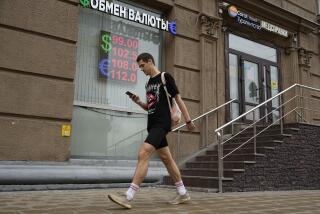Euro Falls Again, Continuing Slide Toward $1 Mark
- Share via
How about spending the holidays in Europe? It’s getting cheaper every day.
The euro currency’s value sank Wednesday to $1.019, its lowest level against the dollar since the record low of $1.014 reached July 14.
Some currency traders believe 1 euro could cost just $1 soon, or even fall below that psychologically important threshold.
The latest slide is a blow to the prestige of the 11 European nations that tied their collective future to the currency when they launched it on Jan. 1 of this year.
The euro’s value was set at $1.17 at the launch, but it fell quickly when trading began, suggesting European leaders had a far more bullish outlook for the currency than have global investors.
A currency’s value can be affected by many things, but the euro’s ongoing weakness is tied to investors’ expectations that European economic growth will remain slower than U.S. growth and perhaps the growth levels in much of Asia.
Faster-growing economies naturally tend to attract more capital as investors look for opportunities. As foreigners buy a country’s or a region’s currency to invest in securities or businesses there, they can push up the value of that currency.
On Wednesday the European Commission estimated that overall economic growth for the euro bloc of nations will be 2.9% in 2000, up from an estimated 2.1% this year and the fastest pace in a decade.
Germany, the largest euro-member country, will grow 2.6% next year, the commission estimated.
But those figures pale next to U.S. growth expectations.
On Wednesday, the United States revised its estimate of third-quarter economic growth to an annualized 5.5%, up from 4.8% previously estimated.
Some analysts said the euro’s latest sinking spell also reflects concern that European governments remain obstacles to structural change that could speed economic growth.
German Chancellor Gerhard Schroeder’s efforts to save builder Philipp Holzmann from collapse, as well as his criticism of Vodafone AirTouch’s hostile bid for Germany’s Mannesmann, suggest that he’s not prepared to push through reforms that the European Central Bank has said are essential to foster growth, analysts said.
“Germany, as the core of euroland, is the one part that’s been really disappointing,” said Martin Price, a money manager at Chiswell Associates in London.
Traders noted that the euro also has fallen to record lows versus the Japanese yen.
“Japan’s got weaker growth than Europe, but the point is that Japan has instituted a structural change” in its economy, said Claudio Piron, treasury economist at Standard Chartered Bank in London.
“Overall there’s a very euro-bearish sentiment in the market,” said Per Norr, a trader at Den norske Bank.
Norr is looking for the euro to move toward the $1 parity level in the next month.
The weak euro isn’t a total disaster for the euro-bloc nations: It means European companies’ exports may be cheaper for foreign buyers. That’s one reason why many European stock markets have been surging this year, despite the currency’s slide.
For American companies, meanwhile, the weak euro--and strong dollar--means U.S. exports are getting more expensive in Europe.
For American travelers, however, the sinking euro is a boon: The currency’s drop from $1.17 on Jan. 1 to $1.019 now means a product priced the same in euros now as then is actually 13% cheaper for Americans.
The 11 nations in the euro bloc are: Austria, Belgium, Finland, France, Germany, Ireland, Italy, Luxembourg, the Netherlands, Portugal and Spain.
* TRADE PACT: Mexico and the EU agreed on the terms of a free-trade treaty. A1
(BEGIN TEXT OF INFOBOX / INFOGRAPHIC)
Euro Bomb
The euro’s value against the dollar is nearing the record low, set in summer. The euro’s trend since its launch Jan. 1:
Jan. 1:
$1.17
Wednesday:
$1.019
Source: Bloomberg News
More to Read
Sign up for Essential California
The most important California stories and recommendations in your inbox every morning.
You may occasionally receive promotional content from the Los Angeles Times.













